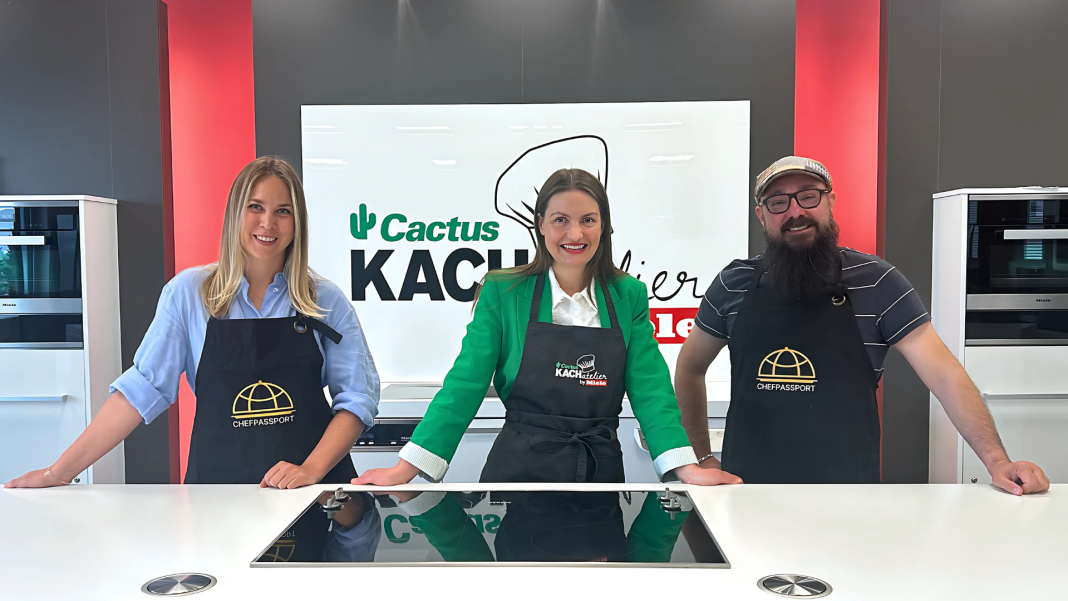At the Cactus shopping centre in Windhof, a state-of-the-art cooking studio offers one of the top settings for immersive culinary team-building—according to ChefPassport founder and CEO Matteo Ressa.
Ressa, whose background includes roles at leading tech companies, created his company by combining two of his passions: travel and food. ChefPassport began as a series of online cooking courses with chefs from around the world, gaining popularity during the covid-19 pandemic, but has since evolved to incorporate a wide variety of international cuisine.
At least once or twice a month, ChefPassport holds immersive team-building experiences at the dedicated cooking studio in Cactus Windhof. Teams of around 16 people can fit comfortably, although as Cactus head of marketing Cathy Leesch explains, the space can accommodate more. For a group of around 65, for example, a culinary evening could see a group being divided into two, with one session focused on wine-tasting or cocktail-making, the other focused on the cooking course, then swapping. There’s also a separate space where businesses can make presentations on the sidelines of the cooking experience.
The studio at Cactus Windhof was developed in 2015 in the space normally used by its 500 employees there (of the 4,000 working for Cactus across the country). The entire site includes its administration and logistics teams, its catering business, a coffee roastery, plus some production for some of its own products, like pastries.
Customised experiences
ChefPassport’s client list includes Amazon, Google and ALDI Luxembourg, to name a few. As Ressa explains, “We mostly work with corporations in Luxembourg that have an international audience.”
Companies seek these cooking experiences for a variety of reasons, including showcasing Luxembourgish cuisine to new employees or temporary visitors, even rewarding employees after a particularly intense work period. The aim isn’t to create master chefs but to provide a memorable evening, and it seems to be paying off: Ressa says their average client satisfaction rating is around 4.9 out of 5.
Ultimately, the experience is fully customisable: “We can create a narrative [for them], with the help of companies like Cactus that are local, and [Luxembourg chef, author and presenter] Anne Faber, one of our flagship chefs for this experience,” he adds.
Connecting through cuisine
Underpinning ChefPassport’s philosophy is the belief that cooking serves as a powerful metaphor for developing soft skills applicable to the working world. Cooking can require delegation, coordination, communication, problem-solving… As Ressa explains, the groups for the pasta-making classes can be divided into four: a team of “engineers”, who fix problems and are charged with figuring out how to build pasta machines; those who want to build some muscles kneading dough; the experimental ones who might help create the sauces; and the “chill” ones, who prefer to sit back and watch, perhaps even enjoy a glass of wine. “We always try to play around with formats, rotating around the fact that cooking is a great tool not only to build meaningful human connections but also to teach something that can be reused in the office on a daily basis,” he adds. “You need to strike a level playing field [no matter the cooking levels] for everyone to enjoy, so simplicity is key.”
Voir cette publication sur Instagram
ChefPassport senior manager of projects and events, Kristina Shumailova, says that the courses focus on quality over quantity and can be personalised, for instance, through aprons that participants can take home as souvenirs. “Not all the people coming to us are looking to learn how to cook,” she notes. “They’re teams that want to bond together, and so we create unique, bespoke experiences for every team.”
But the connection isn’t just amongst the participants. Even from the age of three, Ressa recalls watching his grandmother making pasta, something she says that’s now “hardwired in my DNA”. When he starts these classes, most participants admit they haven’t tried making their own pasta. “But the first time you put the dough in the cutting machine, and the tagliatelle just comes out, it’s like wow! That’s the moment, when I observe people’s faces, where I realise we’re giving people something unforgettable—new knowledge, experiences, emotions.”
Read more articles:
Luxembourg: Autonomous Mobility Testbed

